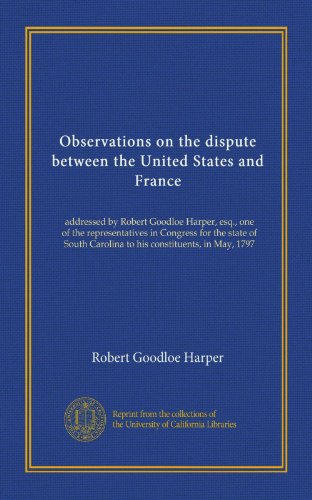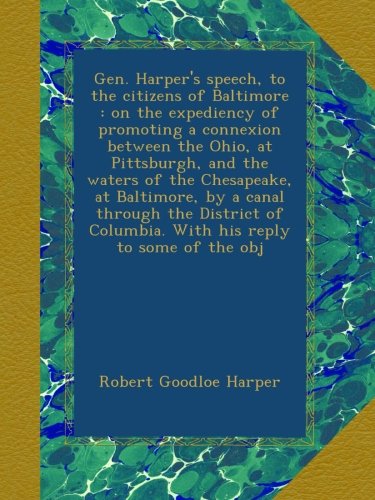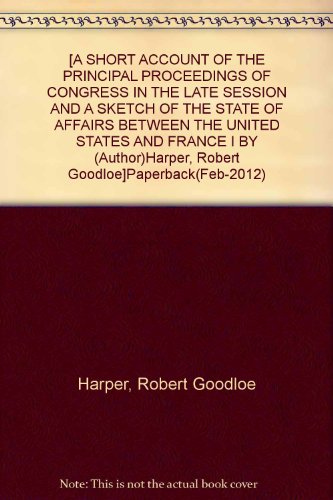Background
Robert Harper was born on January 1, 1765, on a farm near Fredericksburg, Virginia, United States. His father, Jesse Harper, was a member of a family which had lived in Spotsylvania County for many years; his mother was Diana Goodloe.



(This book was digitized and reprinted from the collection...)
This book was digitized and reprinted from the collections of the University of California Libraries. It was produced from digital images created through the libraries’ mass digitization efforts. The digital images were cleaned and prepared for printing through automated processes. Despite the cleaning process, occasional flaws may still be present that were part of the original work itself, or introduced during digitization. This book and hundreds of thousands of others can be found online in the HathiTrust Digital Library at www.hathitrust.org.
https://www.amazon.com/Observations-dispute-between-United-States/dp/B0067D63UU?SubscriptionId=AKIAJRRWTH346WSPOAFQ&tag=prabook-20&linkCode=sp1&camp=2025&creative=165953&creativeASIN=B0067D63UU

(This book was originally published prior to 1923, and rep...)
This book was originally published prior to 1923, and represents a reproduction of an important historical work, maintaining the same format as the original work. While some publishers have opted to apply OCR (optical character recognition) technology to the process, we believe this leads to sub-optimal results (frequent typographical errors, strange characters and confusing formatting) and does not adequately preserve the historical character of the original artifact. We believe this work is culturally important in its original archival form. While we strive to adequately clean and digitally enhance the original work, there are occasionally instances where imperfections such as blurred or missing pages, poor pictures or errant marks may have been introduced due to either the quality of the original work or the scanning process itself. Despite these occasional imperfections, we have brought it back into print as part of our ongoing global book preservation commitment, providing customers with access to the best possible historical reprints. We appreciate your understanding of these occasional imperfections, and sincerely hope you enjoy seeing the book in a format as close as possible to that intended by the original publisher.
https://www.amazon.com/Gen-Harpers-speech-citizens-Baltimore/dp/B00B66R596?SubscriptionId=AKIAJRRWTH346WSPOAFQ&tag=prabook-20&linkCode=sp1&camp=2025&creative=165953&creativeASIN=B00B66R596

(This book was originally published prior to 1923, and rep...)
This book was originally published prior to 1923, and represents a reproduction of an important historical work, maintaining the same format as the original work. While some publishers have opted to apply OCR (optical character recognition) technology to the process, we believe this leads to sub-optimal results (frequent typographical errors, strange characters and confusing formatting) and does not adequately preserve the historical character of the original artifact. We believe this work is culturally important in its original archival form. While we strive to adequately clean and digitally enhance the original work, there are occasionally instances where imperfections such as blurred or missing pages, poor pictures or errant marks may have been introduced due to either the quality of the original work or the scanning process itself. Despite these occasional imperfections, we have brought it back into print as part of our ongoing global book preservation commitment, providing customers with access to the best possible historical reprints. We appreciate your understanding of these occasional imperfections, and sincerely hope you enjoy seeing the book in a format as close as possible to that intended by the original publisher.
https://www.amazon.com/Papers-James-Bayard-1796-1815/dp/B00A8U9SEG?SubscriptionId=AKIAJRRWTH346WSPOAFQ&tag=prabook-20&linkCode=sp1&camp=2025&creative=165953&creativeASIN=B00A8U9SEG

https://www.amazon.com/PRINCIPAL-PROCEEDINGS-CONGRESS-Feb-23-2012-Paperback/dp/B008Q2RJR6?SubscriptionId=AKIAJRRWTH346WSPOAFQ&tag=prabook-20&linkCode=sp1&camp=2025&creative=165953&creativeASIN=B008Q2RJR6
Robert Harper was born on January 1, 1765, on a farm near Fredericksburg, Virginia, United States. His father, Jesse Harper, was a member of a family which had lived in Spotsylvania County for many years; his mother was Diana Goodloe.
When Robert was four years old the family moved to Granville County, North Carolina. There the boy was taught for a time and then sent away to school. When Cornwallis invaded the state after the battle of Camden, Harper joined a cavalry troop which served under General Greene until Cornwallis left the state. He then returned to his studies for a time, but he was eager for a military life and his father promised to educate him with that in view. He made a surveying tour through Kentucky and Tennessee in 1783, and graduated from the College of New Jersey (now Princeton University) in 1785. He then studied law in Charleston, South Carolina.
In 1786 Rpbert Harper was admitted to the bar and began to Practise at Ninety-Six. He indulged at the same time his interest in politics by writing for the press and upon his return to Charleston in 1789 he was elected to the lower house of the legislature. In 1791 he was made manager of a company interested in the Georgia western lands and went to Philadelphia to sell stock. The company failed, but Harper’s stay in Philadelphia turned his mind toward a national career. He returned to South Carolina in 1794, bought a plantation in Ninety-Six District, and offering himself as a Republican candidate for the Fourth Congress in that district, was elected. Harper became a successful candidate for election and took his seat February 9, 1795, serving until March 4, 1801. During this period he frequently wrote long letters to his constituents in which he explained his course in Congress and urged upon them an approval of his policies. These letters were published and brought him something which he never overlooked - considerable public notice.
In 1795 Harper swich on the other side and became a leader of the Federalists. In 1797 Harper published his Observations on the Dispute Between the United States and France which attracted great attention at home and in Europe and ran through many editions. Praise of it so went to Harper’s head that Fisher Ames remarked that it had half spoiled him. He was eager, too, for war with France. He saw in it boundless party advantage and implored Hamilton in April 1798 to become secretary of war. He personally had visions of military glory and although Hamilton recommended him for appointment as aide to Washington, as “a man of very considerable talents, ” Washington replied that he preferred men of experience. In 1799 Harper urged that the Sedition Act be retained in force, though he was most anxious that the debate on the question should not be allowed to reach the people. In 1800 he opposed reduction of the army and a little later he opposed reducing the navy. In the campaign he was bitter in his opposition to Jefferson and the Republicans, and when the election was thrown into the House, he voted for Burr until the final ballot when with the other South Carolina Federalists he refrained from voting. Throughout the final session he remained a stanch defender of Federalist legislation.
By 1801 the handwriting was on the wall for the Federalist party in South Carolina, and Harper himself was particularly unpopular, but he had already determined not to seek reelection. In his profession Harper soon built up a productive practice and a considerable reputation. He was one of the managers of the William Blount impeachment in 1798; he represented Judge John Pickering and Justice Chase in their impeachment trials; he was associated with John Quincy Adams in the case of Fletcher vs. Peck. He was also prominent in Baltimore in civic and business affairs as well as in his profession.
When the British attacked Baltimore in 1814, Harper took part in the battle of North Point and later in the year was appointed major-general of the Maryland troops. On January 16, 1816, he was elected to the United States Senate. He was as of old a frequent and extended speaker, but he resigned in December on the ground that his business engagements would not allow him to serve. He was the Federalist candidate for vice-president in 1816, and in that year and in 1820 the Delaware electors voted for him. Early in 1825 Harper decided to give up his practice and all business connections, and to return to public life, but a few days after he had announced that he would be a candidate for Congress in the autumn of 1826, he died.
Robert Harper had genuine ability as a lawyer, appearing as counsel in many important cases in the appellate courts of Maryland and Pennsylvania. He was also active in the organization of a company which established the first water system, and in the organization of the Baltimore Exchange. He was influential in the selection of Africa as the place for the colony and it was he who suggested Liberia and Monrovia as suitable names for the colony and its capital. The town of Harper, Liberia is named after him.
(This book was originally published prior to 1923, and rep...)
(This book was originally published prior to 1923, and rep...)
(This book was digitized and reprinted from the collection...)
Up to the time of his election Harper had been an enthusiastic Republican. He had been radical in his pro-French sympathies, was vice-president of the Jacobin Club of Charleston, and in 1793 had almost haunted the French consulate and “dined there every day. ” But in Philadelphia the great and powerful were on the other side and almost immediately he began to shift his position, supporting the Jay Treaty in 1795, favoring Adams or Pinckney in 1796 instead of Jefferson for president, and displaying anti-French and proBritish feelings. Recognized finally as a leader of the Federalists, he was chairman of the committee of ways and means and was the most frequent and voluble debater in his party. In 1798 he was an enthusiastic advocate of the alien and sedition laws and urged the limitation of citizenship to the native born.
In his later years his greatest interest was the negro problem. In 1800 he had opposed the emancipation of slaves, though he favored the abolition of the slave trade. By 1817 he had become actively interested in the matter of colonizing the negroes outside the United States, hoping that it might lead to the establishment of a system of free white labor in the South.
Quotations: "Millions for defense, but not one cent for tribute. "
Harper was one of the original members of the American Colonization Society and a member of the American Antiquarian Society.
Socially Harper was friendly, genial, and entertaining. Later he became a social lion, was a dandy in dress, acquired pomposity of appearance and manners, and, self-confident to the point of bumptiousness, he became the most insolent man in the House.
Quotes from others about the person
“He was diffuse but methodical and clear to be considered in some degree artificial. ” - Justice Story
Harper engaged to Catherine Carroll, the daughter of Charles Carroll of Carrollton, who violently opposed the match, and in May 1801 he married her and moved to Baltimore. Ultimately they established a handsome estate, “Oakland, ” four miles out in the country.
